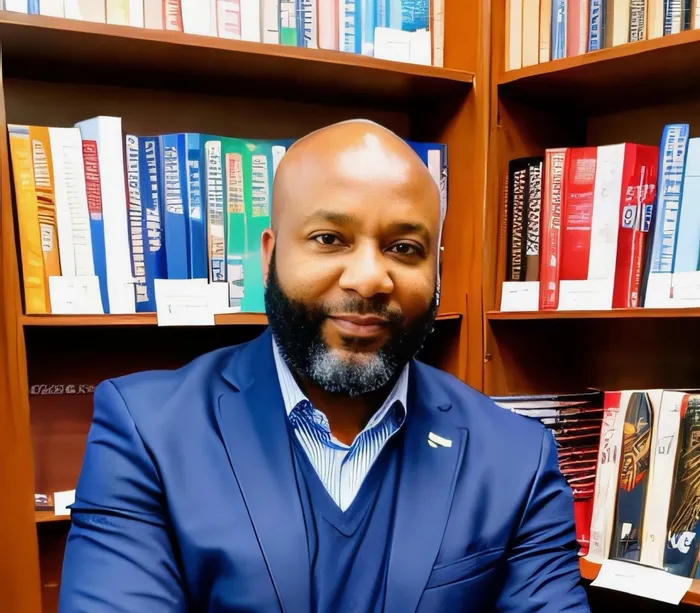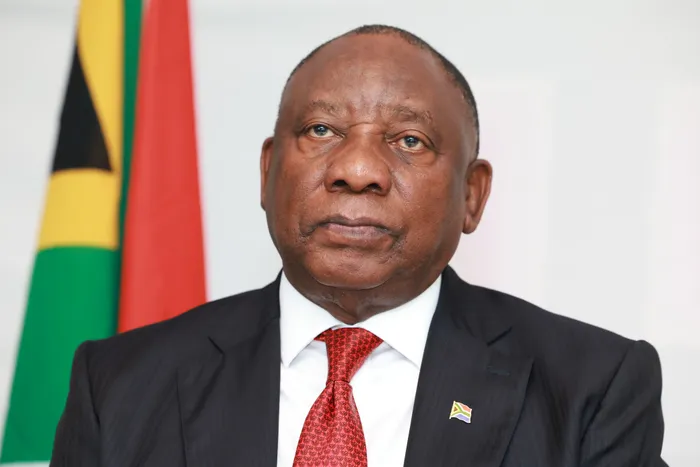Ramaphosa's appointment of acting minister is constitutionally flawed

Nco Dube a political economist, businessman, and social commentator. Picture: Supplied
Image: Supplied

PRESIDENT Cyril Ramaphosa's appointment of acting Police Minister Firoz Cachalia is constitutionally flawed and was also a missed opportunity for decisive and ethical non-partisan leadership, argues the writer. | GCIS
Image: GCIS
NCO DUBE
EREYESTERDAY, President Cyril Ramaphosa addressed the nation in response to the explosive allegations made by Lieutenant-General Nhlanhla Mkhwanazi, the KwaZulu-Natal Provincial Police Commissioner. The country had hoped for a moment of clarity, courage, and decisive leadership. Instead, what we received was a speech that, while measured and legally cautious, ultimately fell short of what South Africa urgently needs. It was a missed opportunity to demonstrate the kind of bold action that could begin to restore public trust in the government and the ruling ANC.
The president’s address typified a style of leadership that many South Africans have come to recognise all too well: the art of kicking the can down the road. The announcement of a commission of inquiry, while ostensibly a step towards accountability, is more likely to delay meaningful action than to deliver swift justice.
The president’s failure to act decisively on key figures implicated in the allegations, particularly Minister Senzo Mchunu, reinforces a growing perception that political expediency trumps accountability within the ANC. Moreover, the constitutional missteps surrounding the appointment of Professor Firoz Cachalia as Acting Minister of Police raise serious questions about the administration’s respect for the rule of law.
This critique will unpack these issues in detail, drawing on the broader context of South Africa’s ongoing struggles with political interference in policing, corruption, and governance failures. It will argue that the President’s response not only fails to meet the moment but also risks deepening the crisis of confidence in the country’s institutions.
The Commission of Inquiry: A Familiar, Flawed Response
The president’s announcement of a Commission of Inquiry to investigate the allegations against Mchunu and the wider problems within the security cluster is, on the face of it, a necessary step. South Africa’s history is littered with commissions that have exposed wrongdoing and set the stage for reform. However, these commissions have also become synonymous with delay, obfuscation, and ultimately, a lack of accountability.
The President’s commission is unlikely to be different. Even though a clear, time-bound mandate was announced, the history of these commissions never meeting their mandated timeframes means that this inquiry risks becoming another protracted process that allows implicated officials to remain in office and continue their work unimpeded. This is a grave concern given the urgency of the situation. South Africans are living daily with rampant crime and a security sector in crisis. They cannot wait years for justice or reform.
The President’s decision to defer action pending the commission’s findings effectively abdicates his responsibility as the country’s leader. The commission is not needed for him to decide whether Minister Mchunu should be removed from office; he needs only the political will to do what is right.
The public mood is one of frustration and impatience. Many South Africans have lost faith in commissions because past experiences have shown that they often serve as political smokescreens rather than engines of justice. The president’s failure to commit to a swift, focused, and transparent process undermines the credibility of this initiative from the outset.
Leadership by Hesitation: The Mchunu Question
One of the most glaring shortcomings of the president’s address was his failure to take a clear stance on Minister Senzo Mchunu. The minister is directly implicated in serious allegations of political interference that have crippled the Political Killings Task Team, a specialised unit that has been instrumental in investigating politically motivated murders. He is also implicated in a very clear allegation of misleading Parliament.
The president missed a crucial opportunity to dispel the widespread perception that he is soft on ANC ministers, especially those perceived to be his allies or members of the dominant faction within the party. This perception has been damaging to his credibility as an anti-corruption leader and has fed into a narrative that the ANC protects its own at the expense of justice and good governance.
There is ample evidence that Mchunu’s conduct has undermined the rule of law and compromised critical investigations and that he lied to Parliament. Yet the president chose not to act decisively, instead opting for a vague commitment to the commission’s process. This sends a dangerous message that political loyalty and factional considerations still outweigh the imperative of accountability.
South Africans are watching closely. They want to see leadership that is willing to make tough decisions, not one that hides behind processes and delays. The president’s inaction on Mchunu risks further alienating the public and emboldening those who believe that the ANC is unwilling or unable to police its own ranks.
Selective Accountability: The Silence on Simelane and Nkabane
The president’s address also conspicuously failed to mention two other ministers facing serious allegations: Human Settlement Minister Thembi Simelane, linked to the VBS Mutual Bank scandal, and Higher Education Minister Nobuhle Nkabane, embroiled in the SETA controversy. Both cases have attracted significant public attention and criticism, yet the president chose not to address them.
This silence is telling. It reinforces the perception that accountability is selective and that some ministers enjoy a degree of protection from scrutiny. For a leader who has repeatedly spoken about renewal and clean governance, this is a disappointing abdication of responsibility.
South Africans expect consistency. If the president is serious about restoring trust, he must be willing to hold all ministers to the same standard, regardless of their factional affiliations or political standing.
The failure to address these allegations in the same breath as those concerning the police ministry and his recent firing of a DA deputy minister suggests a political calculus that prioritises factional balance over ethical governance. This undermines the president’s stated commitment to renewal and risks deepening factional divisions within the ANC.
Constitutional Concerns: The Appointment of Cachalia
The President’s invocation of section 91(3)(c) of the Constitution to justify the appointment of Professor Firoz Cachalia as Acting Minister of Police was constitutionally flawed. This section permits the appointment of up to two Cabinet Ministers from outside the National Assembly but does not empower the President to appoint an Acting Minister.
The correct constitutional provision is section 98, which allows the President to assign the powers or functions of a Cabinet member who is absent or unable to perform their duties to another existing Cabinet member. It does not provide for the appointment of a new member of the Executive as an acting minister.
This legal misstep is more than a technicality. It undermines the rule of law and raises questions about the administration’s respect for constitutional norms. Professor Cachalia must be appointed as a full Cabinet Minister before he can lawfully serve as Acting Minister of Police. The concept of an acting cabinet member does not exist in South African constitutional law.
This error reflects a worrying casualness in the application of constitutional principles by the presidency. In a country where the rule of law is already under strain, such misinterpretations risk further eroding public confidence in the government’s commitment to lawful governance.
The Broader Context: Political Interference and Erosion of Trust
The allegations made by Lt-Gen Mkhwanazi and the president’s response must be understood within the broader context of South Africa’s ongoing struggle with political interference in policing and governance.
Since the advent of democracy, South Africa has grappled with the tension between the constitutional imperative for an independent, professional police service and the political temptation to use policing as a tool for factional advantage or personal protection. This has manifested in numerous scandals and crises, from the “spy tapes” saga to the Marikana massacre and the Phala Phala saga.
The current crisis is the latest and perhaps most explosive example of this pattern. The removal of case dockets from the Political Killings Task Team and the disbandment of the unit itself represent a direct assault on the independence of law enforcement and the rule of law.
This pattern of political interference has had devastating consequences. It has weakened the capacity of the police to investigate and prosecute crime effectively, undermined public trust, and contributed to a culture of impunity.
The Human Cost: Rampant Crime and Public Fear
While political and constitutional debates rage, ordinary South Africans continue to live in fear of crime. The President’s address, regrettably, did not adequately acknowledge the scale and severity of the crime crisis facing the country.
Rampant violent crime, including murder, assault, and armed robbery, is a daily reality for many communities. The inability of the police to protect citizens erodes social cohesion and fuels vigilantism. The president missed an opportunity to speak directly to the fears and frustrations of ordinary South Africans.
A genuine commitment to a comprehensive security sector overhaul is urgently needed. This must include not only leadership changes but also reforms in police training, accountability mechanisms, resource allocation, and community engagement.
The ANC and the president must be seen and heard as alive to the plight of the people, not distant or indifferent.
Decisive Leadership and Swift Action
South Africa is at a critical juncture. The public mood is one of frustration, anger, and despair. Crime is rampant, governance is perceived as corrupt and self-serving, and confidence in political leadership is at an all-time low.
In this context, the President’s speech was a missed opportunity to restore hope and demonstrate that the ANC is alive to the plight of ordinary South Africans.
What is needed now is:
-Acknowledge the severity and unacceptability of the rampant crime crisis.
-Commit unequivocally to a comprehensive security sector overhaul.
-Take immediate and visible action against ministers implicated in corruption and maladministration.
-Establish a focused, time-bound commission or task force with a clear mandate and deadline.
-Communicate with empathy, clarity, and transparency.
-Uphold constitutional norms scrupulously in all appointments and decisions.
Conclusion: The Cost of Inaction
President Ramaphosa’s address will be remembered not for its leadership but for its deferral and equivocation. The art of kicking the can down the road may buy time, but it comes at the cost of public trust, institutional credibility, and the president’s own legacy.
South Africans deserve better. They deserve a leader who will seize the moment, confront entrenched corruption, and restore the rule of law. The time for commissions and consultations has passed. The time for decisive, principled action is now.
(Dube is a political economist, businessman, and social commentator on Ukhozi FM. His views don't necessarily reflect those of the Sunday Tribune or IOL. You can read more of his articles at: ncodube.blog)